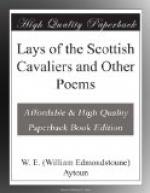The forces of the latter scarcely amounted to one-third of those of his antagonist, which were drawn up in line without any reserve. He was therefore compelled, in making his dispositions, to leave considerable gaps in his own line, which gave Mackay a further advantage. The right of Dundee’s army was formed of the M’Lean, Glengarry, and Clanranald regiments, along with some Irish levies. In the centre was Dundee himself, at the head of a small and ill-equipped body of cavalry, composed of Lowland gentlemen and their followers, and about forty of his old troopers. The Camerons and Skyemen, under the command of Locheill and Sir Donald Macdonald of Sleat, were stationed on the left. During the time occupied by these dispositions, a brisk cannonade was opened by Mackay’s artillery, which materially increased the impatience of the Highlanders to come to close quarters. At last the word was given to advance, and the whole line rushed forward with the terrific impetuosity peculiar to a charge of the clans. They received the fire of the regular troops without flinching, reserved their own until they were close at hand, poured in a murderous volley, and then, throwing away their firelocks, attacked the enemy with the broadsword.
The victory was almost instantaneous, but it was bought at a terrible price. Through some mistake or misunderstanding, a portion of the cavalry, instead of following their general, who had charged directly for the guns, executed a manoeuvre which threw them into disorder; and, when last seen in the battle, Dundee, accompanied only by the Earl of Dunfermline and about sixteen gentlemen, was entering into the cloud of smoke, standing up in his stirrups, and waving to the others to come on. It was in this attitude that he appears to have received his death-wound. On returning from the pursuit, the Highlanders found him dying on the field.
It would he difficult to point out another instance in which the maintenance of a great cause depended solely upon the life of a single man. Whilst Dundee survived, Scotland at least was not lost to the Stuarts, for, shortly before the battle, he had received assurance that the greater part of the organised troops in the north were devoted to his person, and ready to join him; and the victory of Killiecrankie would have been followed by a general rising of the loyal gentlemen in the Lowlands. But with his fall the enterprise was over.
I hope I shall not be accused of exaggerating the importance of this battle, which, according to the writer I have already quoted, was best proved by the consternation into which the opposite party were thrown at the first news of Mackay’s defeat. “The Duke of Hamilton, commissioner for the parliament which then sat at Edinburgh, and the rest of the ministry, were struck with such a panic, that some of them were for retiring into England, others into the western shires of Scotland, where all the people, almost to a man, befriended them; nor knew they whether to abandon




